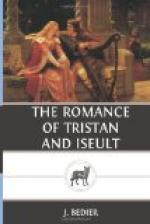So she found Tristan, and to save the lovers she taught him a device, nor was ever known a more subtle ruse of love.
Behind the castle of Tintagel was an orchard fenced around and wide and all closed in with stout and pointed stakes and numberless trees were there and fruit on them, birds and clusters of sweet grapes. And furthest from the castle, by the stakes of the pallisade, was a tall pine-tree, straight and with heavy branches spreading from its trunk. At its root a living spring welled calm into a marble round, then ran between two borders winding, throughout the orchard and so, on, till it flowed at last within the castle and through the women’s rooms.
And every evening, by Brangien’s counsel, Tristan cut him twigs and bark, leapt the sharp stakes and, having come beneath the pine, threw them into the clear spring; they floated light as foam down the stream to the women’s rooms; and Iseult watched for their coming, and on those evenings she would wander out into the orchard and find her friend. Lithe and in fear would she come, watching at every step for what might lurk in the trees observing, foes or the felons whom she knew, till she spied Tristan; and the night and the branches of the pine protected them.
And so she said one night: “Oh, Tristan, I have heard that the castle is faery and that twice a year it vanishes away. So is it vanished now and this is that enchanted orchard of which the harpers sing.” And as she said it, the sentinels bugled dawn.
Iseult had refound her joy. Mark’s thought of ill-ease grew faint; but the felons felt or knew which way lay truth, and they guessed that Tristan had met the Queen. Till at last Duke Andret (whom God shame) said to his peers:
“My lords, let us take counsel of Frocin the Dwarf; for he knows the seven arts, and magic and every kind of charm. He will teach us if he will the wiles of Iseult the Fair.”
The little evil man drew signs for them and characters of sorcery; he cast the fortunes of the hour and then at last he said:
“Sirs, high good lords, this night shall you seize them both.”
Then they led the little wizard to the King, and he said:
“Sire, bid your huntsmen leash the hounds and saddle the horses, proclaim a seven days’ hunt in the forest and seven nights abroad therein, and hang me high if you do not hear this night what converse Tristan holds.”
So did the King unwillingly; and at fall of night he left the hunt taking the dwarf in pillion, and entered the orchard, and the dwarf took him to the tall pine-tree, saying:
“Fair King, climb into these branches and take with you your arrows and your bow, for you may need them; and bide you still.”
That night the moon shone clear. Hid in the branches the King saw his nephew leap the pallisades and throw his bark and twigs into the stream. But Tristan had bent over the round well to throw them and so doing had seen the image of the King. He could not stop the branches as they floated away, and there, yonder, in the women’s rooms, Iseult was watching and would come.




